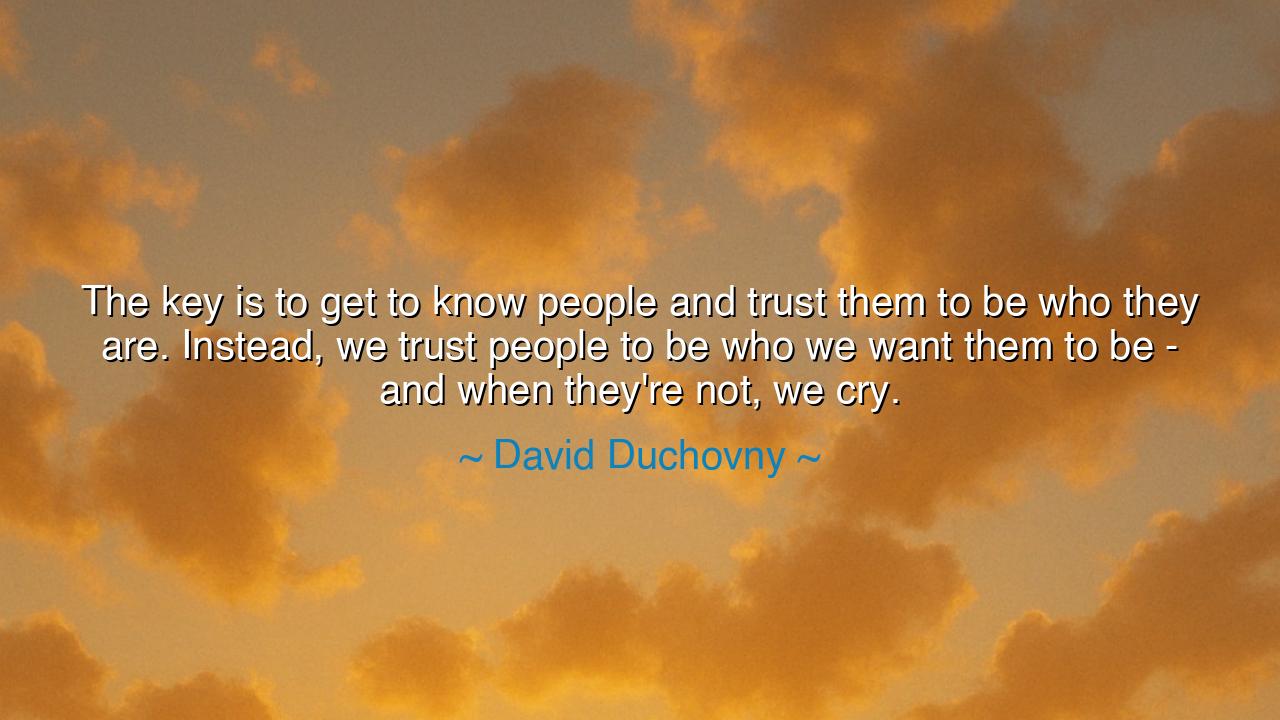
The key is to get to know people and trust them to be who they
The key is to get to know people and trust them to be who they are. Instead, we trust people to be who we want them to be - and when they're not, we cry.






Hear now the words of David Duchovny, who speaks a truth that resonates deeply in the human experience: "The key is to get to know people and trust them to be who they are. Instead, we trust people to be who we want them to be - and when they're not, we cry." In these words, Duchovny points to the essence of trust, a trust that must be based not on expectations or projections, but on the raw, unfiltered truth of who people truly are. We often find ourselves disappointed not by the failure of others, but by our own misguided expectations—trusting people to conform to a vision of who we want them to be, rather than accepting them for who they truly are. The deeper wisdom in Duchovny’s words is a call to acceptance, to see others not as projections of our desires, but as they truly are, with all their complexities and imperfections.
In the ancient world, the Greeks spoke often of the importance of wisdom in understanding others. The great philosopher Aristotle, in his writings, emphasized the need for prudence—the ability to see things clearly, as they truly are, and to act accordingly. He believed that the foundation of strong relationships and a harmonious society lay not in trying to change others, but in understanding them. Aristotle’s notion of virtue was not about molding others into a preconceived idea of goodness, but about recognizing and nurturing the goodness that already exists in each person. To trust others to be themselves, to see their strengths and weaknesses, is an act of wisdom. When we cease to project our desires upon others and instead embrace them as they are, we find deeper connections.
Consider the example of Socrates, whose teachings on self-awareness and dialogue sought to illuminate the truth of human nature. Socrates did not try to mold people into idealized versions of themselves but instead encouraged them to engage in open dialogue to discover their true selves. His method was one of questioning, not of imposing an answer. By asking his students to examine their lives and their beliefs, he encouraged them to trust their own insights and to accept their own limitations. The essence of his teaching was that true wisdom lies in accepting others for who they are, not in demanding they fit into a box of our own making. Socrates, through his conversations, demonstrated that trust grows not by imposing expectations, but by understanding the true nature of another.
In the realm of leadership, the Roman Emperor Marcus Aurelius exemplified this wisdom. Though he ruled over a vast empire, Marcus Aurelius understood the limitations and complexities of human nature. He wrote in his Meditations that we should not be surprised when people fail to meet our expectations, for they are driven by their own inner forces, their own desires and flaws. To demand that they be otherwise was folly. Instead, he recommended accepting others as they are, understanding their nature, and recognizing that their actions are often driven by things beyond our control. Aurelius saw that the key to true leadership—and to peace of mind—was to trust others to be who they are and to adjust our expectations accordingly. He knew that failure to do so led only to frustration and disappointment.
Duchovny's words touch upon this universal truth: when we place unrealistic expectations upon others, we set ourselves up for inevitable disillusionment. People, in all their complexity, will never fit neatly into the mold we desire. This is not to say that we should abandon all hopes of growth or change in others, but rather that we must approach others with humility and acceptance. We must meet people where they are, not where we wish them to be. This deep understanding of human nature, a willingness to see others without the fog of our projections, is the true foundation of authentic relationships.
The lesson to be drawn here, O children of wisdom, is this: true trust comes from accepting others for who they are—not who we want them to be. If we wish to form deeper, more meaningful connections, we must allow people the space to be themselves. Trust cannot thrive in the soil of expectations, for such soil is barren. It is only when we nurture our relationships in the fertile ground of acceptance, when we understand that people will always have their own truths and flaws, that the full potential of trust can flourish.
In your own life, practice this wisdom: trust others to be who they are, without forcing them into your own mold of what you want them to be. Listen, not to the expectations you have of them, but to their true selves. When we stop crying over unmet expectations, and instead accept the reality of others, we unlock the deep connection that can only come from true understanding. Walk through the world with open eyes, willing to see people as they truly are, not as figments of your desires. In doing so, you will find the deepest trust, the most genuine relationships, and the joy that comes from seeing others fully for who they are.






AAdministratorAdministrator
Welcome, honored guests. Please leave a comment, we will respond soon